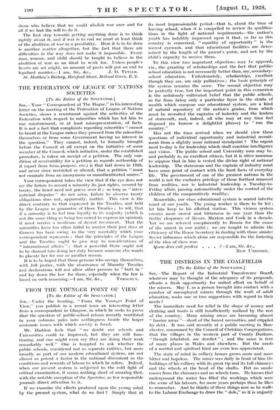FROM THE YOUNGER POINT OF VIEW
[To the Editor of the SPECTATOR.] SIR,—Under the heading, " From the Younger Point of View," you publish in a recent issue an interesting letter from a correspondent in Glasgow, in which he seeks to prove that the question of public-school reform recently ventilated in your columns pales into nothingness beside the larger economic issues with which society is faced.
Mr. Haddon feels that " no doubt our schools and Universities could be improved, but they are still func- tioning, and one might even say they are doing their work remarkably well." One is tempted to ask whether the public schools, considered not as separate entities, but more broadly as part of our modern educational system, are not almost as potent a factor in the national discontent as the conditions and rewards of labour to which he refers. Indeed when our present system is subjected to the cold light of critical examination, it seems nothing short of amazing that, with the notable exception of the Spectator, so few responsible journals direct attention to it.
If we examine the effects produced upon the young mind by the present system, what do we find ? Simply that at its most impressionable period—that is, about the time of leaving school, when it is compelled to review its qualifica- tions in the light of national requirements—the nation's youth has indelibly impressed upon it that, so far as this country is concerned, " equality of opportunity " is the merest eyewash, and that educational facilities are deter- mined by the length of the parent's purse, and not by the child's capacity to receive them.
To this view two important objections may be opposed,
viz., the granting of scholarships and the fact that public- school education is not necessarily better than, say, secondary- school education. Unfortunately, scholarships, excellent though they are, are only palliatives ; the basic principle of the system remains the same. The second objection may be perfectly true, but the important point in this connexion is the sedulously cultivated belief that the public schools, so far from being only a particular layer in the strata of wealth which compose our educational system, are a kind of natural repository of the nation's genius, from which must be recruited the captains of industry and the leaders of statecraft, and, indeed, all who may at any time feel disposed (to borrow a delightful phrase) to " run the country."
Has not the time arrived when we should view these questions of individual opportunity and industrial recruit- ment from a slightly more rational standpoint ? The urgent need to-day is for leadership which shall combine intelligence and vision. The public school and University man may be, and probably is, an excellent citizen, but it is utter nonsense to suppose that in him is vested the divine right of national leadership. The statesman and the captain of industry must have some point of contact with the hard facts of everyday life. The government of one of the greatest nations in the world is not the exclusive privilege of those furthest removed from realities, nor is industrial leadership a Tuesday-to- Friday affair, passing automatically under the control of the children of the comparatively wealthy.
Meanwhile, our class educational system is seared into the mind of our youth. The young worker is there to be led ; let him keep to his allotted station. This vicious system creates more unrest and bitterness in one year than the frothy eloquence of Messrs. Maxton and Cook in a decade. Yet we are referred complacently to Russia for the cause of the unrest in our midst ; we are taught to admire the efficiency of the Home Secretary in dealing with those sinister Soviet influences which alone are responsible for the fostering of the idea of class war.
Quern dens cult perdere . . . ?—I am, Sir, &c.,
NEW UNIONIST.




























 Previous page
Previous page